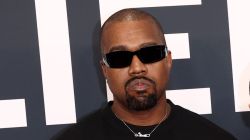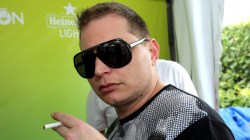Pioneering Hip Hop visionary Fab 5 Freddy first exploded into the popular consciousness thanks to an opportune mention in the song, “Rapture,” the hit Blondie track that was a staple in the New York City new wave clubs back in the early 1980s.
At that time, though, Freddy — born Fred Brathwaite in Brooklyn — was mostly known for his visual arts (better known as, of course, graffiti) than he was for being a patron of the Hip Hop arts.
Nevertheless, it seemed he was trying to send a message way back when, via a punky blonde white girl named Debbie Harry, who informed the world that “Fab 5 Freddy told [her] everybody’s high.”

AD LOADING...
“Did you know that records show that white people smoke marijuana at the same rate as Black and Latino folks?” he asked HipHopDX, rhetorically. “Yet, they’re incarcerated at a much lower rate. You ever wonder why that is?”
One needn’t think very long to come up with the answer, of course — there is a world of difference between how a black man and a white man are made to answer for the same crimes, even to this day — but in case there are a few people left in the Year of Our Lord, 2019, who are completely unaware of racial disparities in America’s criminal justice system, Fab 5 Freddy is here to spell it out for you in black and white (or, more correctly, green) in the Netflix documentary, Grass is Greener.
As the name implies, Grass is Greener explores the history of cannabis — weed — pot — the Devil’s Lettuce — marijuana — any name you want to call it — in popular culture. Originally gaining popularity on the American jazz scene in the early 1920s, Freddy shares that lawmakers sought to criminalize marijuana as a result, and ultimately succeeded in doing so thanks to their steady stream of anti-marijuana propaganda.
“Jack Herer addressed this in his book, The Emperor Wears No Clothes: Hemp and the Marijuana Conspiracy,” he said. “Countless studies concluded that marijuana was not dangerous. At all. But all those studies got swept under the rug. Why? Because they didn’t want black people to make money.”

AD LOADING...
https://www.youtube.com/watch?v=o9L2Qv51vH0
By the time the 1980s rolled around — when Freddy was at the height of his popularity, and Hip Hop was first starting to make a dent on popular culture — New York City had enacted its draconian Rockefeller drug laws, which were considered the “gold standard” in the War on Drugs. The laws — which Freddy vividly remembers, for obvious reasons — were so severe that even a minor possession could lead to decades-long incarceration.
And New York, as it has been wont to do since it was founded, set the trend for other cities across the country — but this time, for all the wrong reasons.
“Jesce Horton, who founded the Minority Cannabis Business Association in Portland, got arrested in college for having just one seed of pot,” he said. “He lost his scholarship, he lost his dream job, he lost everything.”

AD LOADING...
But that’s when Hip Hop, inadvertently, rode into the proverbial frame as the unsung heroes of the pro-pot movement. Rising from the ashes of communities who were destroyed by various drugs and the harsh incarceration of their heads of household, Hip Hop stars of the 1990s started testing the bong waters and seeing the public response.
One such group that was more vocal than most about their love of Mary Jane was none other than Cypress Hill, whose founding member B-Real is prominently featured in Grass is Greener. (Fellow 420-friendly Hip Hop participants include Snoop Dogg, Killer Mike, and Damian Marley.)
“You know, on one hand, you don’t want to dismiss Cypress Hill as just ‘Stoner Hip Hop.’ You really don’t. Because their music is so much more than that,” said Freddy. “But on the other hand, Muggs from Cypress Hill originally said that he wanted his group to be looked at as ‘the Cheech & Chong of Hip Hop.’ And in the end, they really did address the issues that black and Latino families face as a result of unfair incarceration for marijuana possession.”
Today, obviously, weed is more socially and, yes, legally acceptable than in years past. But that doesn’t mean that the fight for equality is over: arrest, conviction, and incarceration has been solely at the discretion of law enforcement and judges. In 2009, New York removed mandatory minimum sentences, which meant that judges could order probation or even addiction treatment in lieu of incarceration, but in news that should shock no one except, maybe, Mike Pence, 86% of those arrested for marijuana possession in New York City in 2018 (!) were either of Black or Latino/Hispanic origin.

AD LOADING...
And while the “medical marijuana dispensary” business is on the rise, it is overwhelmingly the domain of rich white hipster trust fund babies, taking money away from the Black and Latino/Hispanic “dimebag man” of years past. Again, in news that should shock no one with a brain, it’s nearly impossible to get a dispensary license if you have a criminal conviction. And since the vast majority of those with a misdemeanor and/or a felony drug conviction are Black and/or Latino/Hispanic, you do the math as to how many minority-owned dispensary businesses exist.
But if math wasn’t your strong suit in school, never fear, because Fab 5 Freddy has done the math for you. “Less than 1% of dispensaries are owned by people of color,” he said. “Now, California has addressed these issues, and tried to make up for this disparity, and they’re the first state to really make that effort. But in terms of equality? We have a long way to go. A long way.”
Stream Grass is Greener on Netflix now.
[apple_news_ad type=”standard”]



